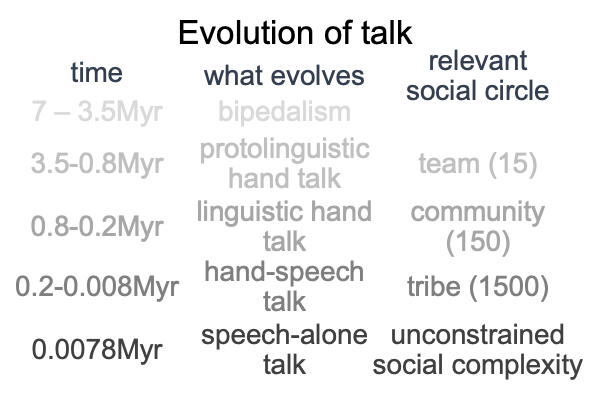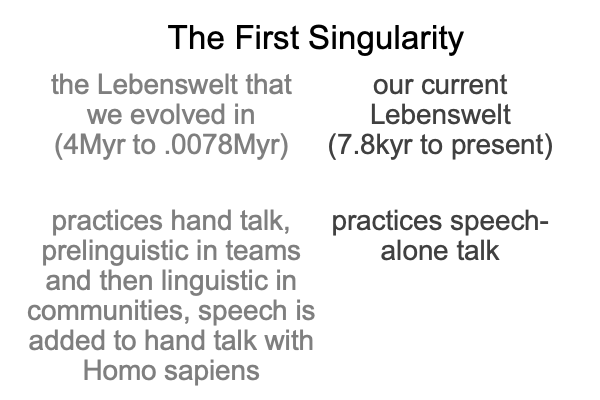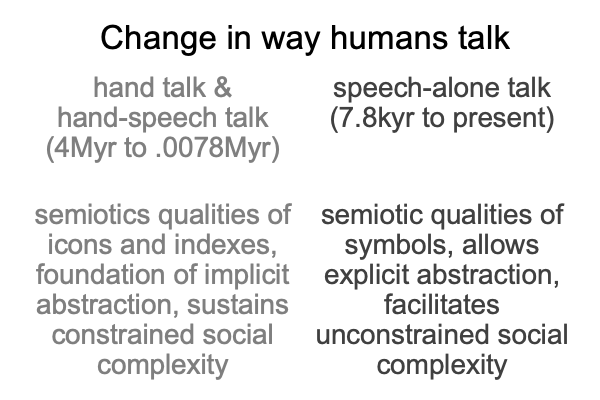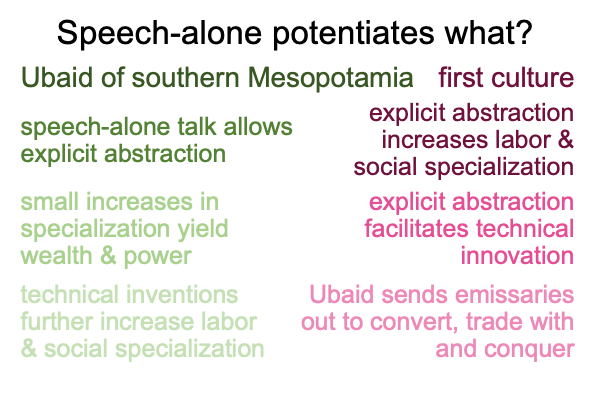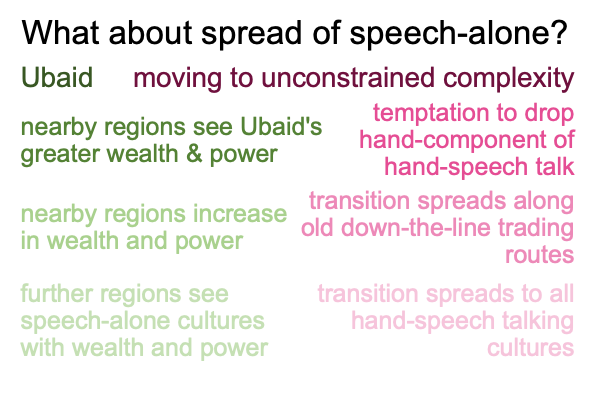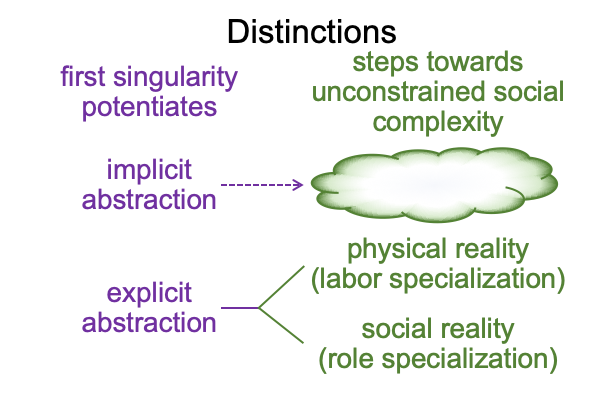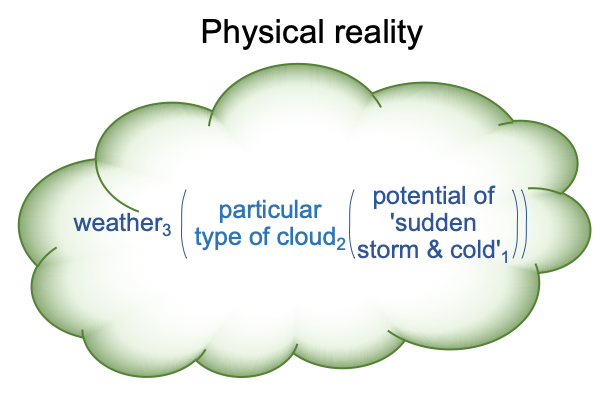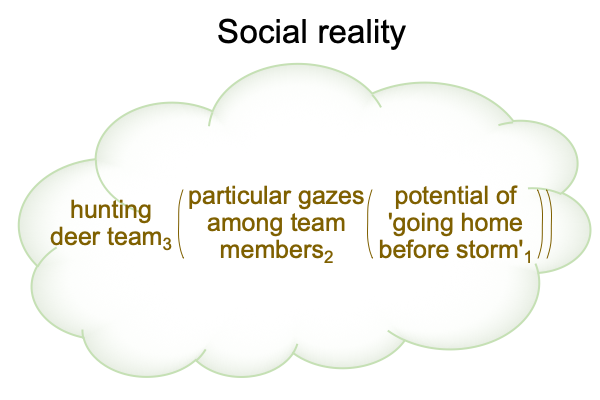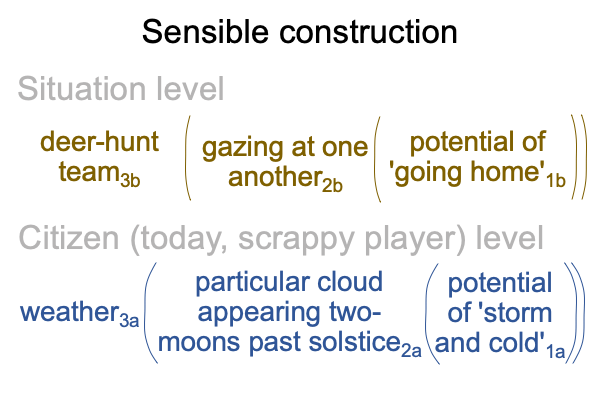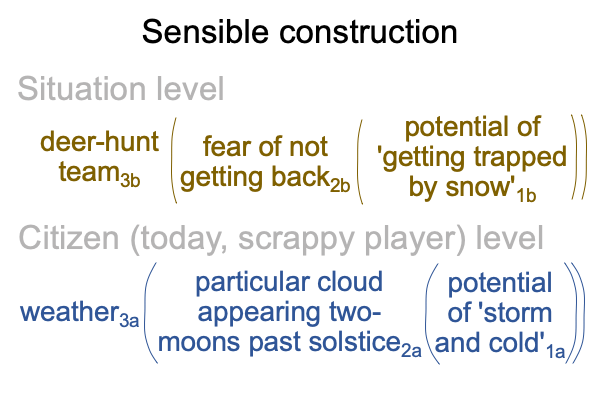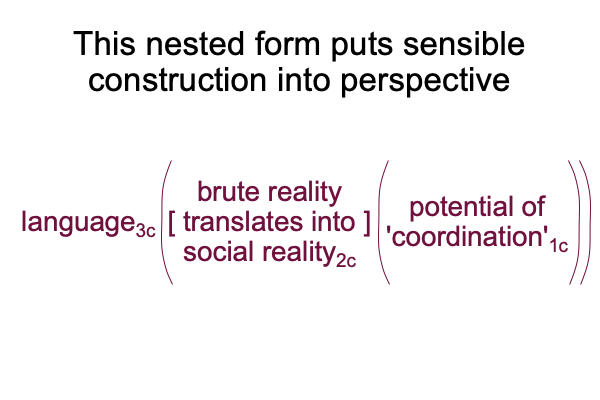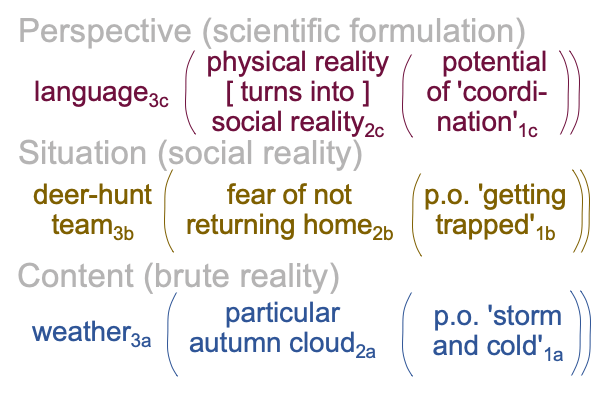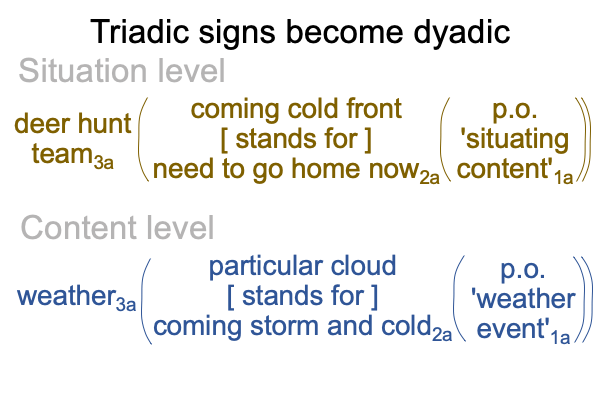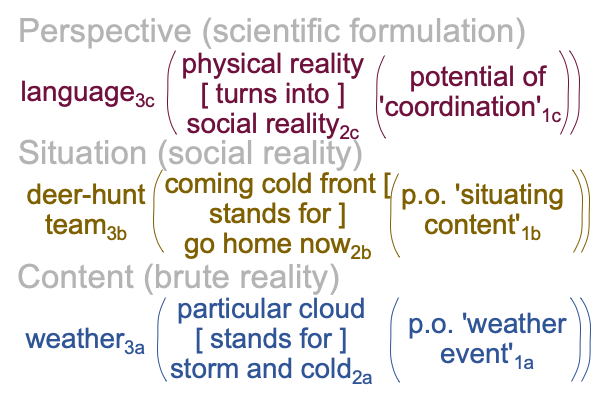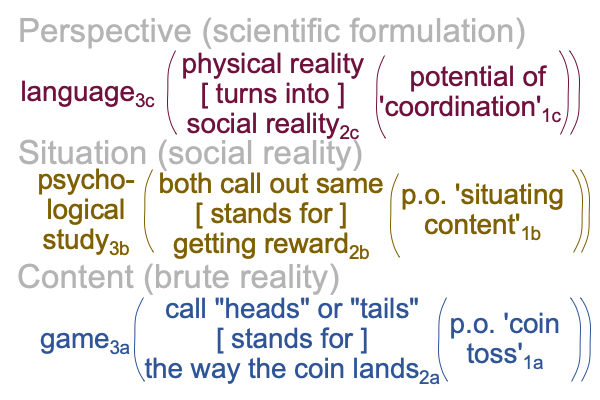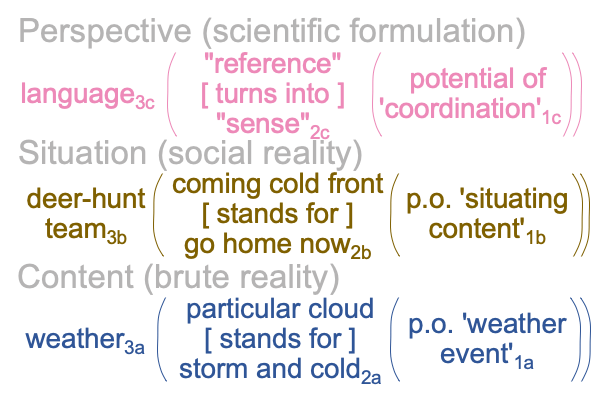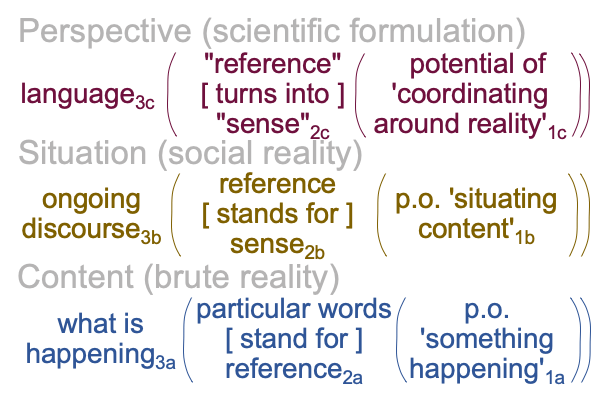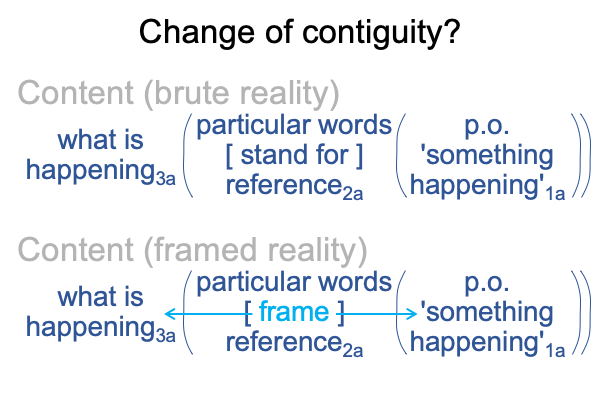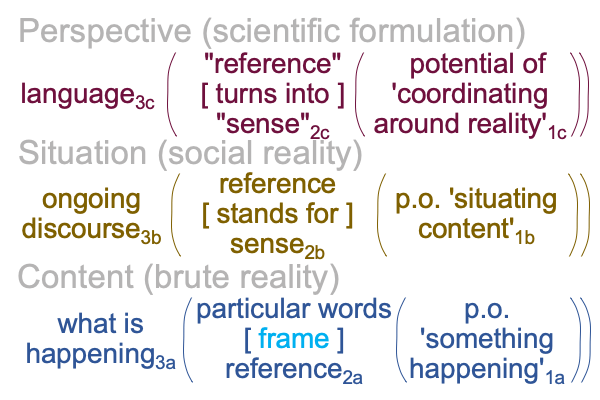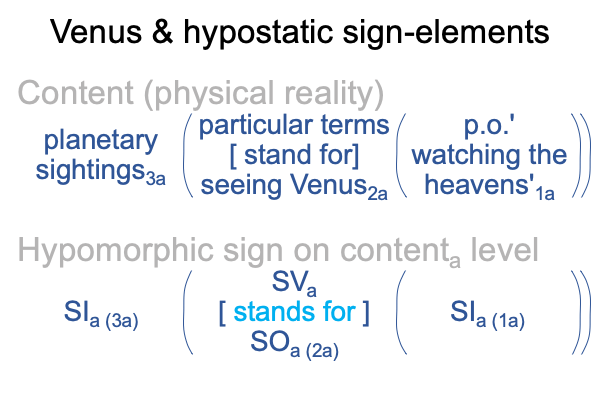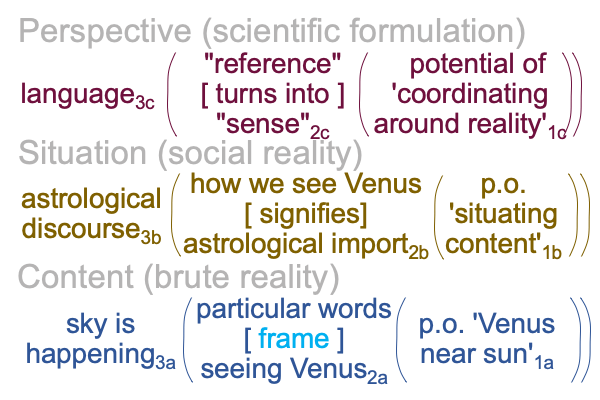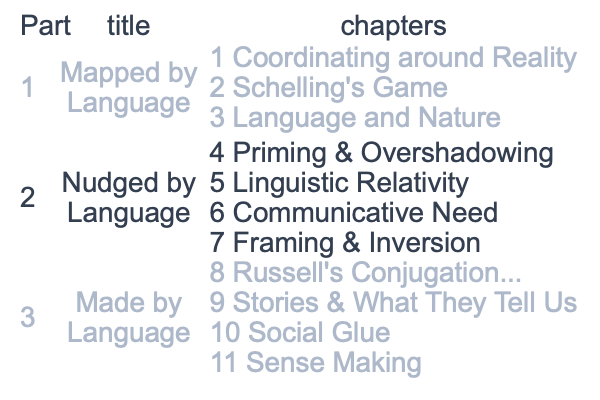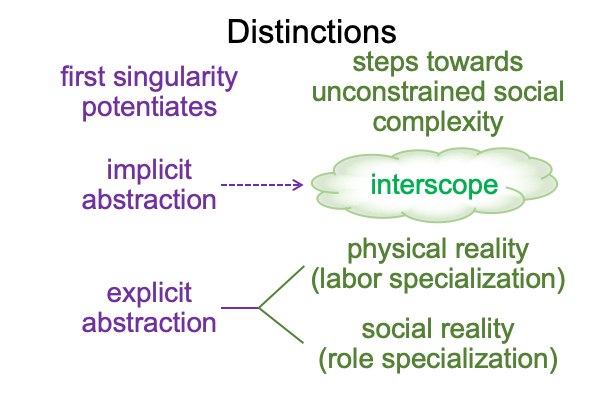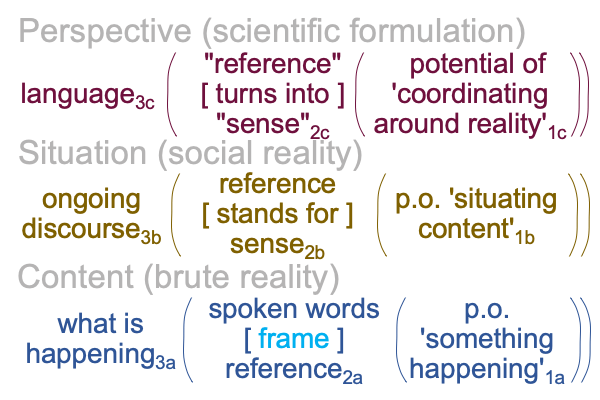Looking at Daniel Houck’s Book (2020) “Aquinas, Original Sin and the Challenge of Evolution” (Part 23 of 23)
0236 Augustine’s mechanism captures the essence of the first singularity. It does not capture the esse_ce. Augustine treats the Garden of Eden as if it is a real story. Instead, the fairy tales of Adam and Eve point to the first singularity.
Similar mythologies from the ancient Near East, revealed during the past three centuries from archaeological excavations, give the same impression. Humans do not have a deep past. Humans are recently manufactured by differentiated gods, who arise out of a foggy, undifferentiated nowhere.
0237 These ancient writings are not known during the Latin Age, so the scholastics do not contest Augustine’s mechanism. Yet, they find that the mechanism is not sufficient, because of those damned dead infants. How can infants express concupiscence?
The concern is both mechanistic and conditional. It can be portrayed as a dyad in the realm of actuality. This actuality corresponds to original sin2.
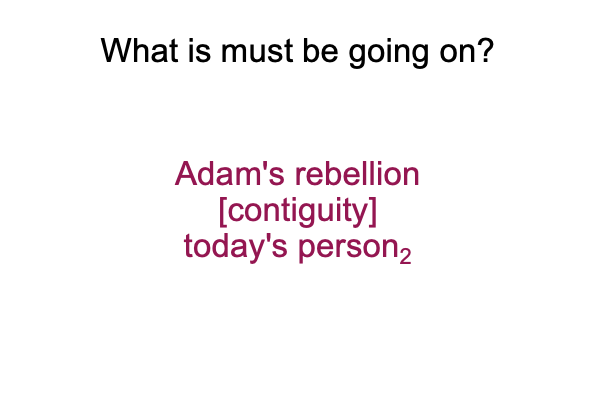
0238 How to describe the contiguity?
Houck lists three scenarios that gain prominence during the Latin Age: disease theory, a legal connection, and a realist view.
These three approaches tie into the above actuality.
0239 Augustine’s conflation of concupiscence and procreation provides a disease mechanism for how Adam’s rebellion infects us.
The legal framework corresponds to God’s Will, which is contained in the command, not to eat the fruit of the tree of the knowledge of good and evil. The status of humanity changes from blessed to cursed. A change in legal status puts Augustine’s conflation into context3.
The realist view is that humans lost something with Adam’s rebellion. The Story of the Fall indicates that humans lost access to the tree of life. A better way to put it is: The tree of life is no longer a possibility1. The Garden of Eden is no longer possible. So, God is no longer present as He once was.
0240 In sum, the scholastics, following Aristotle’s four causes, place Augustine’s mechanism into a complete category-based nested form.
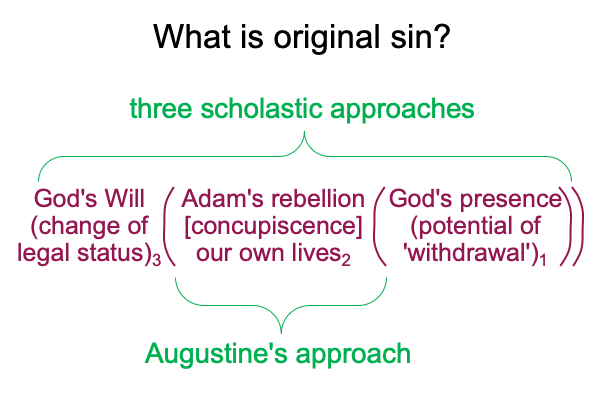
0241 Perhaps, the reader can predict my next move.
I wonder, “Can this nested form go into the perspective level of divine suprasubjectivity?”
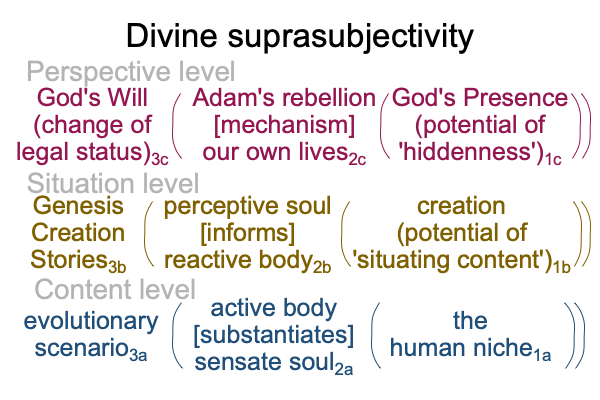
Or, does it correspond to what Christian doctrine projects into perspective-level elements?
Here is how the perspective level changes.
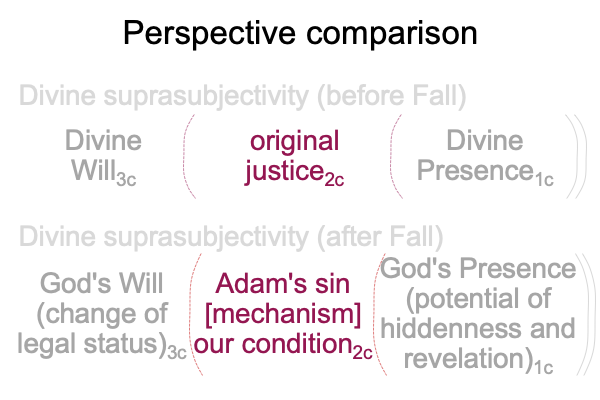
Note how the normal context3c and potential1c have changed character, they are now qualified.
Note how the judgment of original justice2c (belonging to thirdness) changes into a mechanistic dyad2c (belonging to secondness).
What are the implications?
0242 A change in perspective for God passes into a change of perspective for humans.
Our commitment2c does not make sense without God’s orientation (grace).
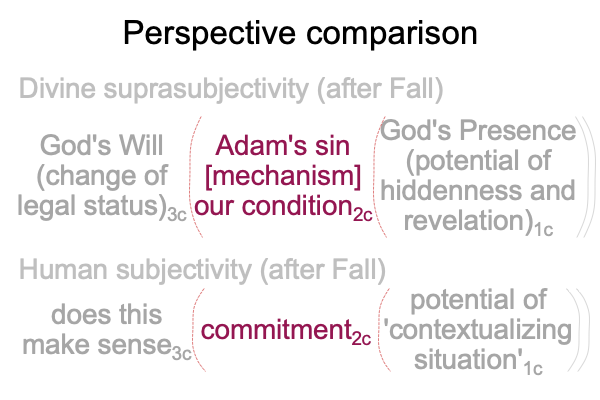
0243 Adam disobeying God’s command changes our legal status3c.
The ejection of Adam and Eve from the Garden of Eden changes God’s Presence1c from open to hidden.
And worse, a mechanism connects Adam’s rebellion to our own lives2c. Augustine’s hybridization of concupiscence and procreation is one mechanism that captures crucial features of the contiguity. However, modern evolutionary science argues for its implausibility. Adam and Eve are not the first human beings. Therefore, they are not the parents of all humans today.
0244 Is there a mechanism that will meet the qualifications of cause-and-effect and offer us (in our current Lebenswelt) a glimpse into who we evolved to be?
Augustine’s mechanism coheres to a literal interpretation of the Story of the Fall. Consequently, the mechanism is not independent of the biblical text.
The mechanism of the first singularity coheres with an interpretation of the Story of the Fall that is appropriate for the genre. The stories of Adam and Eve are fairy tales. Fairy tales are stories that are told to children. Often, they are preserved with remarkable precision over hundreds (and for these stories, thousands) of years. They may point to some primal event. That event cannot be reconstructed from the fairy tale itself. That event must be postulated independently of the fairy tale.
The hypothesis of the first singularity fits the criteria of (1) cause-and-effect and (2) a connection to the Genesis text. But, it does not allow us to appreciate how the twist in human evolution touches base with the doctrine of original sin.
0245 This is why Aquinas’s postulation of original justice2c is so crucial.
Original justice2c pertains to the Lebenswelt that we evolved in.
Original sin2c pertains to our current Lebenswelt.
Original sin2c is the privation of original justice2c.
Speech-alone talk is the privation of the hand-component of hand-speech talk.
Speech-alone talk attaches labels to the elements within the perspective-level actuality2c.
Why stop there?
Spoken words can label every element on the perspective level, as well as the situation level, as well as the content level.
This is not possible in iconic and indexal hand-speech talk.
0246 The Story of the Fall tells a tale, rich in details that call to mind the first singularity.
With the assistance of the serpent, Eve attaches spoken labels to the fruit of the tree of the knowledge of good and evil. Then, her spoken words generate the reality of Adam’s rebellion.
0247 Thousands of years later, scholastics refine the Story of the Fall into a perspective-level category-based nested form for original sin.
They know nothing about the content level, as it currently is configured by modern science.
They know that the content level pertains to crucial questions, “Where does the world come from? Where do we humans come from?”
They know that the situation-level addresses the question, “What went wrong?”
They figure that we cannot return to the Garden of Eden. We cannot go back to the original justice2c, enjoyed by Adam before his rebellion.
This explains why revelation is necessary.
0248 Jesus Christ fills the emptiness inherent to original sin. No one, not even infants, can avoid that emptiness. Original sin is the privation of original justice.
From this, Latin-Age scholastics cobble together a normal context3c and a potential1c for the mechanism connecting Adam’s rebellion to our current lives2c.
0249 Speech-alone talk facilitates the scholastic’s exercise in exemplar extrinsic formal causality. Speech-alone talk permits the articulation of exemplar signs.
The sign-vehicle (SVe) consists of phantasms that arise from the recitation of the Story of the Fall2b.
The sign-object (SOe) is the perspective-level actuality2c.
The sign-interpretant (SIe) is as shown below.
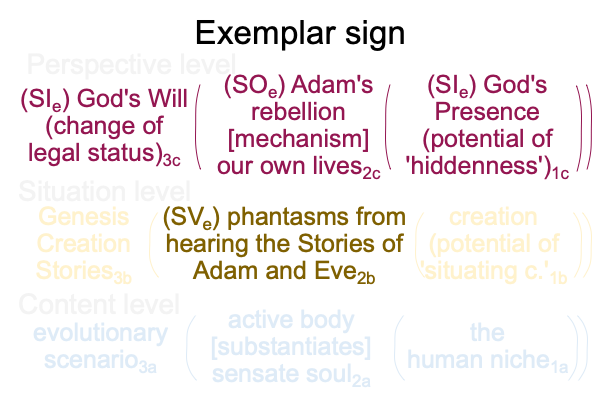
0250 In this exemplar sign, Augustine’s version of original sin2c initially stands where original justice2c used to be. Original sin2c overwrites original justice2c. This is what spoken words do. Our verbal rhetoric can never recapture the wholeness of the commitment2c that we evolved to sense and feel2a. But, it sure can trigger our longing for that wholeness.
Yet, Augustine’s vision captures an essential feature of our own lives2c. We are fallen.
0251 Similarly, the proposed confluence of Adam’s rebellion and a change in Lebenswelt may occupy the contiguity in the dyad where original justice2c used to be. Again, this proposal somehow distorts the judgment. But, it does so in a way that scientists cannot dismiss out of hand. The hypothesis of the first singularity is not the second doctrine of original sin. However, it offers a mechanism that reflects quite nicely in the mirror of theology.
See Comments on Mariusz Tabaczek’s Arc of Inquiry (2019-2024) by Razie Mah, available at smashwords and other e-book venues (also appearing in Razie Mah’s blog from April through June 2024).
0252 Not unlike Augustine’s first version of original sin, the first singularity offers a suite of insights that are difficult to ignore. First, it is mechanistic in the way that science is mechanistic. Second, it challenges current paradigms on human evolution, but not the data that support them. Neodarwinism has not come to grips with the possibility that the human niche is not material. Modern evolutionary science has yet to entertain the idea that human evolution comes with a twist. Plus, the twist is metaphysical.
And, what better place to look for the metaphysical tools to construct the second doctrine of original sin, than those formulated by Thomas Aquinas and re-formulated by Charles Peirce, who is about to be baptized in the same way that Aquinas baptized Aristotle and Averroes?
0253 So, I conclude my comments on Daniel Houck’s Book (2020) Aquinas, Original Sin, and the Challenge of Evolution. My thanks to the author and apologies for wandering far and wide.
0254 And, what about the turtle?
When I place the apparently dead turtle into the pond. Its head and feet poke out from under the shell. It swims away. The pond is its Umwelt.
We (humans) are not so fortunate. We can never return to the Lebenswelt that we evolved in. Nor can we create our own utopia. The most we can hope for is some miraculous redemption of our current Lebenswelt. This is precisely what God delivers.

